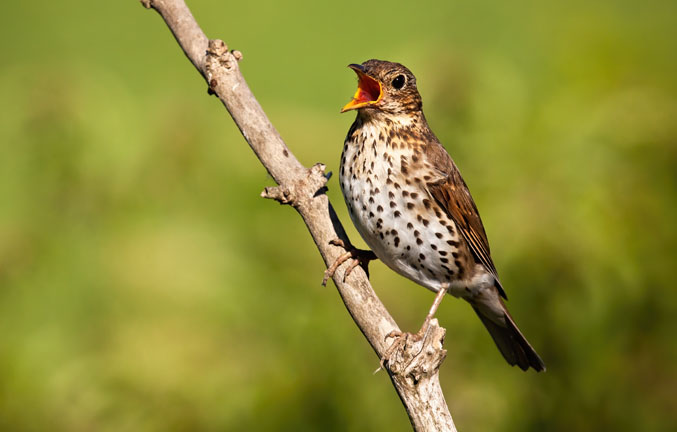E-Newsletter Signup
For special offers, updates and news of new products join our newsletter.
- Also in Blogs
- Sustainable Camping: Preserving Nature for Future Generations
- Embracing the Renewal of Spring: Camping Adventures Await.
- Beating The Winter Blues!
- The History of Cycling
- Senior Camping: Young at Heart
- View all posts in this category >>
GUEST BLOGGER
If you would like to contribute to our blog as a guest and can bring fresh outdoor experiences, please:
Birdsong: A Spring Chorus
Posted in Blogs on 14th March 2023
When the weather’s chilly and we’re coming out of a gloomy winter, there’s nothing better than a spring chorus of birdsong to lift the spirits.
March is the first time of the year when songbirds start singing at early dawn. Rather like a feathered alarm clock, between March and July, birds will be defending their territory and singing to attract a mate.
While spring flowers such as daffodils and crocuses are an outward sign of the change in seasons as they poke through the earth, birdsong at dawn is an audible reminder that winter is over.

© WildMedia / Shutterstock.com
Why do birds sing at dawn?
There’s a popular saying that “the early bird catches the worm”. The proverb means that the person who starts a task early is maximising their potential to achieve success.
In literal terms, the early bird is actually likely to catch the worm! Birds locate worms mainly through their good vision. Those that are active at dawn are more likely to spot the tip of the worm as it pokes through the soil – so they get more food!
When it comes to birds singing at dawn, the early risers also have the best chance of attracting a mate when there are fewer rivals around.
The first birdsong starts around an hour before dawn. Some species start singing before others including blackbirds, skylarks, song thrushes and robins. Warblers and wrens seem to have a more relaxed approach to the dawn chorus, typically appearing later in the morning.
When you listen carefully, you can hear the different birdsong of the various species. Keen bird watchers can listen to soundbites online, from sites such as the RSPB, to distinguish between each different species’ song, as they can be very distinct.
Which bird species sing later into the season?
Nature is an expert at timing the songbirds’ breeding season to the hottest time of the year: the summer months, when food is plentiful and the daylight hours are long, give the parents time to forage to feed their chicks.
The longer daylight hours of spring make the male songbirds amorous, and they burst into song to attract a mate.
The first species of the season to mate are resident British birds, such as great tits and robins. Later in spring, they are joined by migrants like blackcaps and chiffchaffs. May and June is the peak time to listen to the dawn chorus. Swifts tend to arrive in May, after wintering in Africa.
Finches nest later in the year and are still actively breeding in July. Some birds, such as the collared dove and woodpigeon, appear to breed at any time of year. Woodpigeons can often be found nesting well into the summer and beyond.
Do birds sing at dusk too?
Birds sing at dusk too, but the dusk chorus is quieter and less vibrant than its dawn counterpart. Some species, such as blue tits and tree sparrows, are known to sing in the evening as darkness falls.
Dunnocks, song thrushes and robins can also be heard in the evening. Robins are well adapted to foraging in dim light and as insect-eaters, they can still find plenty of food on a mild spring evening.
People tend to take less notice of the dusk chorus. It may be because as we lie in bed in the morning, we are much more aware of birdsong. We’re trying to enjoy a little longer in bed, but the dawn chorus makes us realise it’s almost time to get up!
Where can you enjoy your dawn chorus?
Most bird watchers agree the best time to listen to birdsong is at dawn, rather than dusk. It is uplifting and joyful to hear the birds singing when all around is silent.
Enjoying the dawn chorus means waiting for the right day, as going outdoors in wind or rain can dampen your enthusiasm. The best type of day is one with clear, fine weather and just a light breeze.
The dawn chorus actually starts just before dawn. The best time of year to listen is from late April to early June, when the weather is starting to warm up and more birds are about. Remember it’s still likely to be chilly early in the morning, even in spring, so wear warm clothes, as nothing spoils the moment more than feeling cold.
Dawn chorus will peak for around an hour, comprising 30 minutes before and 30 minutes after sunrise. Birdwatchers tend to get into position a good hour before dawn to enjoy the gradual arrival of the birds and hear their song reach its crescendo.
Whether you’re venturing for an early morning ramble, or enjoying a camping holiday and listening to the dawn chorus in a tranquil rural setting, sitting down to breakfast and a hot drink can make the experience complete.
As one of the most magical gifts nature has to offer, the dawn chorus is music to anyone’s ears. Lifting the spirits, the sensual stimulation of birdsong is calming, soothing and stimulating. Very precious, indeed.



